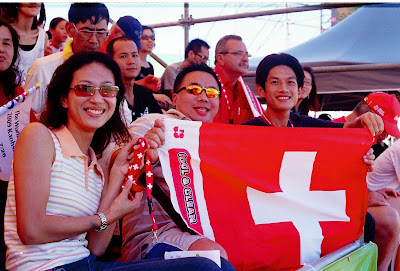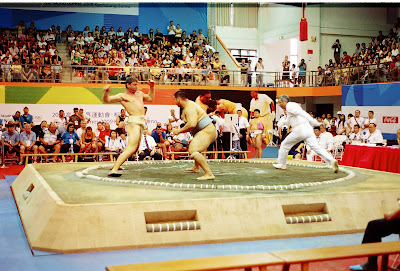 VIDEO: How did your favorite korfballer do?
VIDEO: How did your favorite korfballer do?Global Post, July 26, 2009
KAOHSIUNG, Taiwan — China snubbed the opening ceremony. A tropical storm forced the canoe polo indoors. And female Brazilian athletes scandalized Taiwan by going topless on a local beach.
But aside from those hiccups, the World Games 2009 — an obscure sporting event run under the patronage of the Olympic Committee but featuring non-Olympic sports — was celebrated in a closing ceremony Sunday as a smashing success.
"The 2009 World Games in Kaohsiung have been the best games ever!" said a punchy International World Games Association president Ron Froelich to a screaming crowd Sunday night.
This year's games had an especially apt setting. Taiwan, the island-nation that craves greater recognition, played host to 31 sports that are fighting for more respect (korfball, fistball, ultimate frisbee).
Sure, it's easy to ridicule a sports event that features competitive "canoe polo" and "artistic roller-skating." But the athletes showed just as much heart as Olympians. And for sheer entertainment value (and novelty), I'll take the World Games.
The Russians came out on top in Kaohsiung, grabbing 18 golds and 47 medals total — compared to the U.S. haul of 13 (26 overall). Italy and China followed Russia in the gold medal count.
Iraq sent one jujitsu athlete who failed to get a medal; ditto the Pakistani beach handball team.
One of the Games' mottos, "The World is Watching," was clearly an overstatement (or wishful thinking — no U.S. broadcaster picked up the Games). But for those few who were tuned in, the Games were a quirky, down-to-earth answer to the over-hyped and security-choked Olympics.
Overall, Taiwan did a great job as host. Japanese architect Toyo Ito's sci-fi, serpentine Main Stadium got rave reviews, and was truly stunning at night — though it was too bad the Games couldn't make more use of the venue (it hosted the opening and closing ceremonies, ultimate frisbee and rugby).
The opening ceremony featured some brilliant creative touches, while avoiding the bombast of last year's ceremony in Beijing. Temple gods rolled into the stadium on neon-lit scooters, in a combination of traditional and contemporary Taiwan. Later, a phalanx of middle-aged "shiqu mama" — community moms, who can be seen doing evening exercises in parks across Taiwan — danced to a throbbing techno beat.
Taiwan was more than prepared to handle the media. At many venues' media centers, volunteers far outnumbered journalists, and security guards would wander in to snatch up all the uneaten snacks. The Taiwanese themselves gave their typical good-humored, humble welcome to foreigners.
"We're still not good enough to compare with the Americans and Australians," taxi driver Tsou Ching-kun said, complaining about Taiwan's athletes. At one subway station, a worker made my day by asking, "Are you an athlete?" Nearby, a young Taiwanese girl tried out a korfball net they'd put up at the station.

"We felt it was time to let Chinese Taipei (the name Taiwan is forced to use in international sporting events, due to China's objections to recognizing it as a state) show that they have the ability to bring an international event of this level to Chinese Taipei," said International World Games Association president Ron Froelich, at one press conference.
Later, asked about China's no-show at the opening ceremony, a clearly frustrated Froelich told me, "I was sad that China deprived its athletes of the chance to meet with other athletes."
"I've told the Chinese myself, 'How can you do that?'" he said.
China never explained its boycott, though observers speculated it had to do with Taiwan President Ma Ying-jeou's presence to kick off the ceremony, or fears of the behavior of pro-independence Taiwanese spectators.
At the closing ceremony, Kaohsiung mayor Chen Chu trumpeted Taiwan's freedoms, in an indirect jab at authoritarian China. "We're a democratic country, so you can see flags of all colors here in this stadium," she said. In the stands, spectators waved green-and-white flags with the word "Taiwan" in English (green is the color of the pro-independence party here) — a display sure to set Chinese nationalists' teeth on edge.
But for the most part, politics stayed on the sidelines as the Games' sports — including the oddball ones — took the stage. Below, a few highlights and explanations from the Games.
Sprechen sie fistball?
Turns out fistball is most popular in German-speaking countries, where it's called "faustball." I talked to a couple of Swiss fistball fans who'd travelled around the globe to support their team. Switzerland, Germany, Austria and Namibia (a former German colony) all have clubs.
"It's a long trip, but it's nice to be here," said Roger Beeler, 23, from Jona, Switzerland. Asked if he liked Taiwanese food, Beeler pointed at his stomach and waved his other hand from side to side in the international gesture for "not so much."
Fistball is similar to volleyball, with a couple of twists. The ball is served from the front row instead of the back, and can bounce once on the other side before being hit, as in tennis. In Kaohsiung, the world champion Austrian team got dethroned, with the Brazilian team taking gold and the Swiss team, silver.Not just Japanese anymore
The scandal-ridden sport of Sumo is increasingly dominated by non-Japanese. (see articles here and here). But at the World Games, Japanese men won two golds, with a Mongolian and Hungarian wrestler winning the other two.
The American male Sumo wrestlers (including lightweight Trent Sabo and heavyweight Kelly Gneiting from Colorado) have their work cut out from them to compete on the world stage, though. They made a valiant effort, but got handily bounced out of the ring by superior foes.
On the women's side, the heavyweight event was dominated by hulking athletes from eastern Europe — Russia, Ukraine and Poland, in that order. Trust me, you wouldn't want to meet any of these women in a dark alley. Play was delayed at one point so the Polish competitor could re-wrap her mawashi.
Steel plum-blossoms trounce all
As expected, the Taiwan women's indoor tug-of-war team marched to victory. Even for jaded correspondents, their performance was awe-inspiring. Competing like the cliched "well-oiled machine", they crushed the U.K., trounced Ukraine, shellacked South Africa and decimated Japan before beating the Netherlands in the hard-fought finals.
It was amazing to watch their opponents writhe and grimace on one side, as the "steel plum-blossoms" gazed impassively ahead, betraying no hint of emotion, then marched backward in unison to victory. Team anchor Chen Li-hui calmly observed the opponents from the back and guided the team, sporting a top-tail sprouting from her head ("It's my habit, for competition," she told me afterwards.)
In the finals Taiwan employed a Muhammad Ali rope-a-dope strategy, letting the Netherlands gain a few centimeters and wear themselves out, before finally launching a killer counter-attack.
Dunking? It's not "cooperative"
Korfball — Dutch basketball — looks fun, but isn't likely to win much respect in N.B.A.-mad America. The athletes' average-size height and an 11 1/2 foot-high basket ("korf") prevented any dunking. An N.B.A. star like Yao Ming could probably do it, but would likely rip the flimsy-looking korf off its pole in the process.
At any rate, such self-aggrandizing behavior would be frowned on as against the "cooperative" nature of this co-ed sport. There's also not much of a physical or running game. Aggressive defense and dribbling are both no-nos. And each eight-person team is divided into an offensive and defensive side (two men and two women each) that can't cross the center line (offense and defense switch roles every two goals).
Players often made what we used to call in elementary school "granny shots" — under-handed throws that would get you laughed off the court. Tempers flared in the final pitting the Dutch world champs against Belgium, with the Belgians indignant at some of the referee's calls.Clash of the kayaks
Canoe polo was much rougher and more exciting than I expected. It starts from the opening, when the ball is tossed to the middle of the pool. Both sides' teams rush to get to it first, resulting in a head-on kayak collision at full speed.
Later, players paddled over each other's kayaks and pushed opponents underwater. It was hard to tell what, if anything, constituted a foul, aside from smacking an opponent in the face with one's paddle.
On the men's side, the Netherlands won handily over the French, despite a large contingent of chanting French fans.
Beach handball got a lot of attention in the local media for the clinging micro-outfits worn by the buff female athletes. Local TV ran side-by-side shots comparing the "waiguoren" (foreigner) uniforms' with the Taiwan team's slightly more conservative look. I couldn't see much of a difference, quite honestly.
Later, scanty garb hit the news again when a few Brazilian female athletes decided to sunbathe topless on a beach in Kaohsiung, in full view of several police and children. The police appeared flummoxed and came in for media criticism for not getting the girls to cover up more quickly.
Taiwan may use scantily-clad "la mei" (spicy girls) to sell everything from computer parts to hot-pot soups. But when it comes to going topless on the beach, the island's conservative side comes out.




















No comments:
Post a Comment